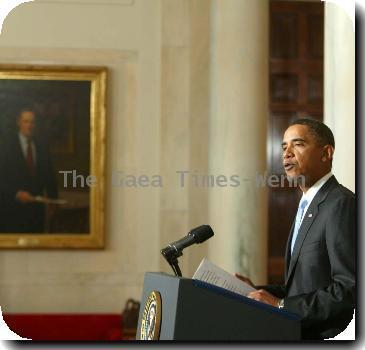Who’s up in new political landscape: Moderates, Maine. Who’s down: Obama and his to-do list
By Calvin Woodward, APWednesday, January 20, 2010
New political order tips against Obama to-do list
WASHINGTON — Among the winners in the new political order: independent-minded voters and the upstart newcomers they favor.
Also on the rise: the few Republican moderates left in Congress, the tea party movement and, paradoxically, both legislative stalling and dealmaking.
Losers? Just have a glance at President Barack Obama’s swollen to-do list. Instead of checking off his planned health care overhaul, climate legislation, energy priorities, judicial appointments and more, he might have to cross some off.
A compendium of winners and losers after Republican Scott Brown won the Massachusetts Senate seat of the late Ted Kennedy on Tuesday:
WINNER: GOP moderates and Maine.
Maine moves closer to the center of the political universe, thanks to its two moderate Republican senators and their likely clout.
Olympia Snowe and Susan Collins are sure to be courted hard, if not on health care, then on other legislation. It’s a strong position to be in and one they know how to use to advantage.
Snowe was the only Republican senator to vote for any version of health care legislation, but Democrats patched together the necessary 60 votes without her to move the bill along. Now they’re short.
LOSER: Obama.
Obama might be able to salvage a health care overhaul of some sort. It’s a big if. Beyond that, other big-ticket items are in jeopardy, and so are smaller ones. It’s difficult to see where he gets the political capital to fulfill promises on letting gays serve openly in the armed forces, for example.
To be sure, Democrats still control Congress. And if Republicans overplay their new hand, voters can take retribution against them in the fall and restore the primacy of Obama’s agenda.
WINNER: Bipartisanship, the force-fed kind.
Until now, odes to bipartisanship have been nothing but cotton-candy words on both sides. Democrats assembled their health care plan and brought it to the brink of becoming law without Republican support. Now the two parties have to eat their veggies and engage for anything meaningful to get done.
Still, the threat of filibuster looms over everything. With all 41 members on board, Senate Republicans can delay most things to death. That’s why they have to be cut in on legislation in ways that were avoidable, just barely, before.
LOSER: Party labels.
Campaigning in one of the bluest of states, Brown rarely mentioned a rather important fact: He’s a Republican. He emphasized his independence instead. A similar approach helped Republicans win governor races in New Jersey and Virginia last year.
Democrats might be expected to follow suit, dissociating themselves with the party brass.
WINNER: Political insurgencies.
Brown’s win emboldens other newcomers who would normally be written off. Could the race to replace Democratic Sen. Chris Dodd of Connecticut in the Senate also become competitive? How about Democratic Sen. Kirsten Gillibrand’s seat in New York? What about conventional favorites on the other side, such as Gov. Charlie Crist in the Florida Republican Senate primary?
The tea-party activists, who powered a summer of discontent over the health care legislation, showed their influence Tuesday in swinging behind the Republican who presented himself as a pickup-driving populist. Grass-roots politics is also a powerful tool of the left, and one Obama used to great effect in his campaign.
But it’s tougher now to attack the establishment when you’re at the pinnacle of it.
LOSER: Americans without health insurance and some health care providers.
Americans with health insurance might gain or lose under the overhaul, depending on which side is right. There’s little question, though, that the uninsured would be helped. And they are bound to have to wait now, or see some protections bargained away.
It’s a mixed bag for providers. Although a health care law would make them live with tough new rules and perhaps pinched profits, they would also gain millions of new customers and become part of a system they helped shape in negotiations.
Drug makers, for example, spent tens of millions of dollars over the past year in support of the Democrats’ effort and had agreed to contribute more than $80 billion to help finance the revamping.
WINNERS and LOSERS: Women.
On one hand, Brown’s victory was a defeat for the activists who labored to get another liberal woman in the Senate. On the other hand, independent women voters went 2-1 for Brown, pollsters for both parties say, after strongly siding with Obama in 2008. That makes them swing voters to watch.
LOSER: Climate change legislation.
Brown’s win makes Obama’s chances of getting a climate and energy bill through Congress more of a long shot. Senators working on a bill to limit heat-trapping pollution already were short of the 60 votes needed for passage. Now they have lost another vote. And fence-sitting Democrats and Republicans are likely to be less willing to support a bill that will increase energy prices heading into midterm elections.
LOSER: Foreign policy.
Obama must still focus on winding down the war in Iraq, where critical national elections soon will require his leadership, and on the increasing U.S. involvement in Afghanistan. But the threat to his domestic agenda from Brown’s victory is bound to distract him from foreign policy broadly.
He has made almost no progress on his vow to bring Israel and the Palestinians back to the negotiating table for work on a two-state solution. Also up in the air: completing a deal with Moscow on a nuclear arms reduction pact and persuading Russia and China to agree to tougher sanctions on Iran.
Associated Press writers Jim Kuhnhenn, Beth Fouhy, Jennifer Loven, Dina Cappiello, Alan Fram and Steven R. Hurst contributed to this report.
Tags: Barack Obama, Energy Policy, Filibusters, Foreign Policy, Government Regulations, Health Care Industry, Health Care Reform, Industry Regulation, Judicial Appointments And Nominations, Maine, Massachusetts, Middle East, North America, Occasions, Parties, Political Issues, Political Organizations, Political Parties, Politics, United States, Washington






